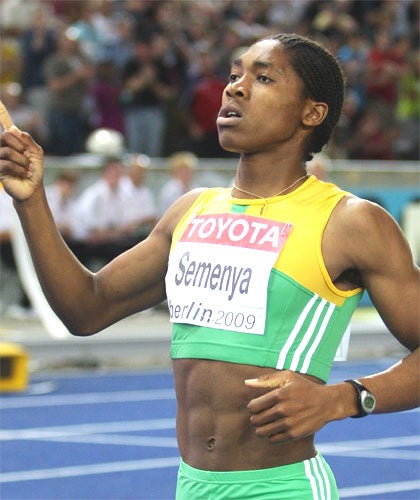Semenya carries fight to IAAF as she hits out at delays
South African claims her human rights have been abused over gender tests

Caster Semenya threw down her gauntlet to the world governing body of athletics yesterday, declaring her intention to return to competitive action despite still awaiting a green light from the International Association of Athletics Federations.
Seven months after her victory in the women's 800m final at the World Championships in Berlin and four months after her status had been expected to be resolved by the IAAF, the 19-year-old South African is still waiting for the governing body to make a ruling about her future in track and field following gender verification tests she was asked to undertake in the wake of her sudden emergence as an untouchable force over the half-mile distance last year. The IAAF have asked Athletics South Africa to keep Semenya away from the competitive arena until her situation has been resolved but the frustration at the delay prompted the teenager's patience to snap yesterday.
Semenya – who has not raced since the World Championships last August – also revealed that her legal representatives had asked the IAAF to release the medical information they had gathered about her, and said that the public scrutiny she had undergone had infringed her "fundamental and human rights".
She said in a statement: "I am an athlete first and foremost and it is vital for my competitiveness, my well-being and for my preparations for events during the European summer that I measure my performance against other athletes. I have constantly taken advice from an esteemed panel of medical and legal professionals and other parties who are close to me. I have been privy to and have evaluated all the relevant information they have placed before me including current IAAF rules and policies. This information has also been placed in the hands of the IAAF. I am of the firm view that there is no impediment to me competing in athletics competitions.
"I will, however, continue to assist the IAAF with whatsoever they may require for their own processes and in this regard I have instructed my legal and medical team to work closely with, and continue negotiation with them for these purposes. I hereby publicly announce my return to athletics competitions."
It had been expected that Semenya's future would be resolved at the IAAF's council meeting in November but on the eve of the World Indoor Championships in Doha three weeks ago, Nick Davies, communications director of the governing body, said: "The IAAF and Caster Semenya's representatives are still in discussion with a view to resolving the issues surrounding her participation in athletics."
Semenya had hoped to return to competition at a meeting in Port Elizabeth on 18 February and there had also been some talk in South Africa of her racing in Stellenbosch yesterday. She added in her statement: "I grudgingly committed to assist the IAAF in concluding its processes which I did not agree with.
"Given that I have rightfully not been disqualified nor suspended from athletics competitions and given also that I expected these processes to be expedited I, on my own volition, resolved not to compete in athletics competitions until these processes had been completed. These processes have dragged on for far too long with no reasonable certainty as to their end resulting in my athletic capabilities and earning potential being severely compromised.
"However, notwithstanding the infringement of my rights, I have attempted to understand and sympathise with the institutional shortcomings within the IAAF. To this end, upon my return from the Berlin World Championships, I instructed my legal advisers to make immediate contact with the IAAF to implore them to make all my medical information in their possession available to me and to meet with my legal advisers for the purposes of resolving what appears to me to be a very simple matter.
"After three formal attempts by my legal advisers to make contact with the IAAF on my behalf, the IAAF had still not responded to my overtures. I requested my legal advisers to prevail upon the government to open negotiations with the IAAF by sending an emissary to negotiate a fair and equitable settlement of this matter.
"The outcome of that lengthy process was the pronouncement that I was not guilty of any wrongdoing or cheating and that I was entitled to keep my gold medal, my prize money [which has now been paid to me] and my ranking as the number one female athlete in the world over the female 800 metre event."
Join our commenting forum
Join thought-provoking conversations, follow other Independent readers and see their replies
Comments